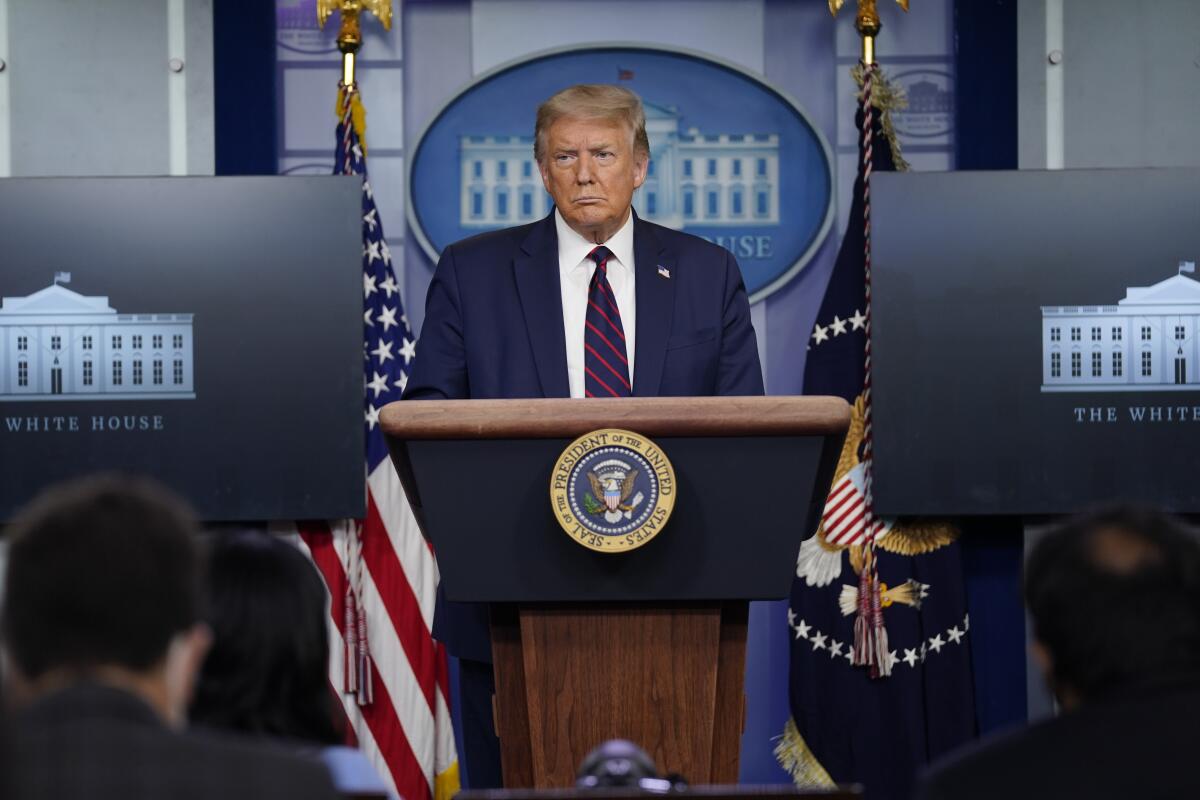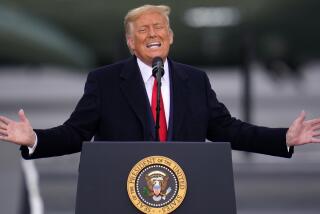Trump concedes coronavirus will ‘get worse before it gets better’

WASHINGTON — President Trump, six months into a deadly pandemic and less than four months from Election Day, conceded Tuesday that the coronavirus would “get worse before it gets better” and urged all Americans to wear face masks “whether you like the mask or not.”
“If you can, use the mask,” he said. “Think about patriotism.”
He admitted his more sober assessment of the virus, which he read from a binder of prepared text, was “something I don’t like saying, but that’s the way it is.” His remarks came on a day when the country recorded more than 1,000 deaths from COVID-19 for the first time since May 29.
Moments later, however, Trump responded to a question without notes and delivered his familiar refrain: eventually “the virus will disappear.”
The president’s first appearance in the White House briefing room since late April marked a shift in rhetoric and strategy that was simultaneously sudden and, in the eyes of many of his advisers, long overdue. It also marked a tacit recognition that the months he’s spent offering unrealistically rosy assessments about the virus or attempting to avoid it altogether have deeply damaged him politically.
An ABC News/Washington Post poll last week showed that 64% of Americans don’t trust Trump’s statements about the virus, a statistic he dismissed as “fake” in an interview Sunday with Fox News Channel’s Chris Wallace.
Polls show Trump trailing the presumptive Democratic nominee, former Vice President Joe Biden, by a double-digit average nationwide and that a number of swing states have tipped toward Biden, with the public giving the president low marks for his coronavirus response.
In recent weeks, Trump had sought to focus on other issues, holding events to highlight regulatory rollbacks, efforts to defend Confederate statues and administration actions on immigration, a strategy to divert the country’s attention from the pandemic advocated by his chief of staff, Mark Meadows.
But Trump’s counselor Kellyanne Conway and others inside the White House, playing to the president’s vanity, eventually succeeded in convincing him he could be more effective if he returned to the podium to directly address the issue of singular importance to the country that also happens to be his biggest political liability.
Trump held lengthy briefings seven days a week in March and April, as the country was first overtaken by the coronavirus. He halted the briefings, which often lasted more than two hours and grew contentious, after a disastrous appearance in which he suggested that bleach injections could serve as a therapeutic in the absence of a vaccine.
Tuesday’s briefing lasted just 35 minutes and featured the president on the dais alone, taking only a handful of questions. Dr. Anthony Fauci, the head of infectious diseases at the National Institutes of Health, who was a fixture at past briefings, said an hour before the briefing began that he was not invited. Dr. Deborah Birx, who leads the White House coronavirus taskforce, was also absent, although the president, asked why his top public health experts weren’t there, claimed Birx was “right outside.”
With the virus surging across the Sun Belt, Trump selectively cited statistics to assert that the recent spike in cases has mostly affected younger Americans.
His remarks betrayed no awareness of how he had politicized the act of wearing masks or prioritized commerce over public health by pressuring governors to lift stay-at-home orders and allow businesses to reopen quickly.
He claimed that governors, several of whom have complained about the lack of assistance from Washington, don’t “need anything right now” and were in harmony with the White House.
“I think we’re all responsible,” he said of himself and governors. “I view it as a team.”
Trump did promise vaguely that a new national strategy was in the offing, months after he and aides predicted the coronavirus would be gone.
“We are in the process of developing a strategy that’s going to be very, very powerful,” Trump said.
Before leaving the briefing room, Trump was asked if he’s ready to be judged based on his response to the coronavirus.
“This, among other things,” he said.
More to Read
Get the L.A. Times Politics newsletter
Deeply reported insights into legislation, politics and policy from Sacramento, Washington and beyond. In your inbox three times per week.
You may occasionally receive promotional content from the Los Angeles Times.











